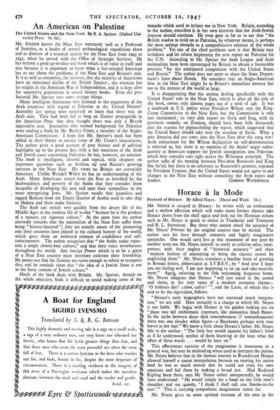An American on Palestine
MR. SPEISER knows the Near East extremely well as a Professor of Semitics, as a leader of several archaeological expeditions there and as director of a research section for the Near East from 1943 to 1945, when he served with the Office of Strategic Services. He has written a good up-to-date text-book which is of value in itself and also because it is important to know what a fair-minded American has to say about the problems of the Near East and Britain's role. It is as well to remember, for instance, that the majority of Americans have an emotional dislike of the British Empire the emotion has its origins in the American War of Independence Empire; it is kept alive for successive generations in school history boas. Even the pro- fessorial Mr. Speiser says some strange things.
Many intelligent Americans who listened to the arguments of the Arab countries with regard to Palestine at the United Nations' Assembly last spring were surprised to learn that there was an Arab case. They had been fed so long on Zionist propaganda in the American Press that they thought there was only a British imperialist case. Journalists who wanted background for Palestine were reading a book by Mr. Bartley Crum, a member of the Anglo- American Commission. I hope that Mr. Speiser's book has been added to their library to correct some of Mr. Crum's inaccuracies. The author gives a good account of past history and of political highlights up to the present day, with a fair statement of the Arab and Jewish cases concerning Palestine; he has, however, no solution. The book is intelligent, shrewd and topical, with chapters on important questions such as Arabian oll and Russia's growing interests in the Near East. His views on Britain are essentially American. Unlike Wendell Wilkie he has an understanding of the Arab. Many Americans return from the East so horrified by the backwardness and poverty of the Arabs that they consider them incapable of developing the area and turn their sympathies to the more enterprising Jews. Mr. Speiser recalls that penniless and ragged Beduins from the Empty Quarter of Arabia used to take ship to Malaya and there make fortunes.
The Arab can switch very quickly from the desert life of the Middle Ages to the modern life of to-day "because he is the product of a mature, yet vigorous culture." At the same time the author shrewdly remarks that the nationalists of the Near East suffer from being "history-haunted "; they are acutely aware of the pioneering role their countries have played in the cultural history of the world, which gives them an awkward mixture of .confidence and self- consciousness. The author recognises that ." the Arabs today repre- sent a single closely-knit culture," and that their voice reverberates throughout the world. Any foreign Power which is to he a guest of a Near East country must therefore cultivate their friendship. He points out that the Zionists are naive enough to refuse to recognise this, and he reminds them that "the idea of a Jewish State is not in the basic content of Jewish culture." Much of the book deals with Britain. Mr. Speiser, though on the whole objective, finds it difficult to avoid making some of the remarks which used to irritate me in New York Britain, according to the author, considers it in her own interests that the Arab-Jewish impasse should continue. He even goes so far as to say that "the British resolve to hold on to Palestine, by whatever means, is perhaps the most serious obstacle to a comprehensive solution of the whole problem." Yet one of the chief problems now is that Britain may withdraw and let others. implement the new report on Palestine for the U.N. According to Mr. Speiser the Arab League and Arab nationalism have been encouraged by Britain to obtain a favourable position "for the anticipated competition with the United States and Russia." The author does not seem to share the State Depart- ment's fears about Russia. He considers that an Anglo-American bloc in the Near East might be to Britain's immediate interest but not to the interest of the world at large.
It is disappointing that the section dealing specifically with the United States' role in the Near East, which Is after all the title of the book, covers only sixteen pages out of a total of 246. It was a landmark in U.S. policy when President Wilson sent the King- Crane Commission to the Near East, but the Commission is only just mentioned ; its very able report on Syria and Iraq, with its pertinent remarks on Zionism, should have been fully discussed; also the reasons for pigeon-holing the report. which suggested that the United States should take over the mandate of Syria. What a pity America did not come into the Near East after the 1914 war ! Arab enthusiasm for the Wilson declaration on self-determination is referred to but there is no mention of the Arabs' anger subse- quently at American support for Jewish immigration into Palestine, which they consider cuts right across the Wilsonian principle. The author talks of the meeting between Pres:dent Roosevelt and King Ibn Sa'ud, but there is no reference to Roosevelt's promise, repeated by President Truman, that the United States would not agree to any changes in the Near East without consulting the Arab rulers and


































 Previous page
Previous page